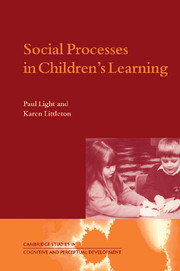Book contents
- Frontmatter
- Contents
- List of figures
- Preface
- Acknowledgements
- 1 Peer interaction and learning: perspectives and starting points
- 2 Peers and puzzles: a first series of studies
- 3 Computers and learning
- 4 Kings, Crowns and Honeybears: a second series of studies
- 5 Gender agendas
- 6 Social comparison and learning
- 7 Interaction and learning: rethinking the issues
- References
- Index
- Cambridge Studies in Cognitive and Perceptual Development
3 - Computers and learning
Published online by Cambridge University Press: 22 September 2009
- Frontmatter
- Contents
- List of figures
- Preface
- Acknowledgements
- 1 Peer interaction and learning: perspectives and starting points
- 2 Peers and puzzles: a first series of studies
- 3 Computers and learning
- 4 Kings, Crowns and Honeybears: a second series of studies
- 5 Gender agendas
- 6 Social comparison and learning
- 7 Interaction and learning: rethinking the issues
- References
- Index
- Cambridge Studies in Cognitive and Perceptual Development
Summary
Introduction
A comprehensive review of the research literature on what computers might have to offer for learning would have to go back a long way to find its starting points (e.g. Suppes, 1966; see also Light, 1997). However, at least in the in the UK, it is only relatively recently that children have been able to secure reliable access to at least one classroom computer, most teachers have received some training in the use of computers, and the school curriculum envisages computer use in most subject areas (Crook, 1994). The prominence given to computers, and the substantial investment of resources entailed in their use, are widespread features of education across the developed world. The psychological theories of learning which have informed the development of educational computer use over the last thirty years or so offer a fair reflection of the psychology of learning more generally across this period. In this chapter we shall explore some of the ways in which psychological accounts of children's learning have contributed to, and been reflected in, the way computer-based learning has developed.
Computers and instruction
Much of the software used in schools, often referred to under the heading of computer-assisted instruction (CAI), owes its origins at least in part to the associationist learning theory tradition in psychology. A leading exponent of that tradition, B.F. Skinner (e.g. 1965), was heavily committed to the idea that machines could be developed which would teach children more effectively than the classroom teacher was able to do.
- Type
- Chapter
- Information
- Social Processes in Children's Learning , pp. 27 - 31Publisher: Cambridge University PressPrint publication year: 2000



